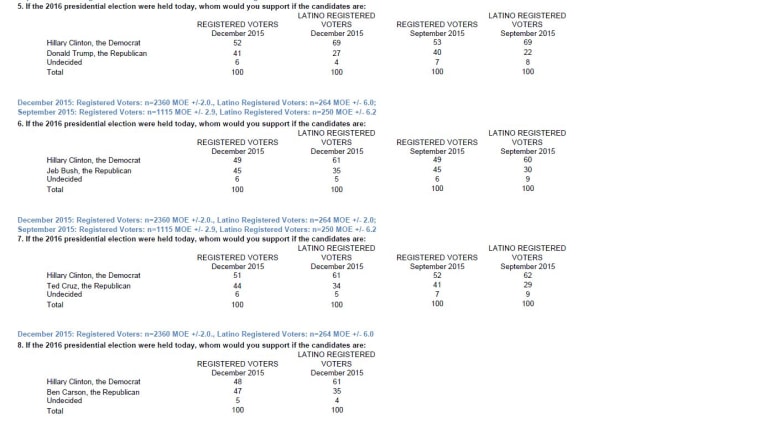Hillary Clinton leads the Republican presidential field in hypothetical general-election match-ups, with Ben Carson and Marco Rubio running the closest to her, according to a new national MSNBC/Telemundo/Marist poll.
And with just one exception, the margin of Clinton's lead among Latino voters determines just how competitive each match-up is.
Clinton's biggest lead is against current GOP frontrunner Donald Trump: She's ahead of him by 11 points among all voters, 52 percent to 41 percent, and a whopping 42 points among Latino voters, 69 percent to 27 percent.
The former Democratic secretary of state leads Ted Cruz by seven points nationally, 51 percent to 44 percent, and by 27 points among Latinos, 61 percent to 34 percent.
Clinton holds a four-point advantage over Jeb Bush, 49 percent to 45 percent, and a 26-point lead among Latinos, 61 percent to 35 percent.
She's ahead of Marco Rubio by three points among all voters, 48 percent to 45 percent, and 19 points among Latinos, 57 percent to 38 percent.
And Clinton leads Ben Carson by just one point, 48 percent to 47 percent, and she holds a 26-point edge among Latinos, 61 percent to 35 percent.


The MSNBC/Telemundo/Marist poll also finds that a generic Democratic presidential is tied with a generic Republican at 45 percent to 45 percent, while that lead expands to 20 points among Latino voters, 56 percent to 36 percent.
To put these Latino poll numbers into perspective, Barack Obama defeated John McCain among Latinos by 36 points in 2008, 67 percent to 31 percent.
And he beat Mitt Romney by 44 points in 2012, 71 percent to 27 percent.
The MSNBC/Telemundo/Marist poll was conducted Nov. 15-Dec. 2, and it interviewed 2,360 registered voters (with a margin of error of plus-minus 2.0 percentage points), and 264 Latino voters (plus-minus 6.0 percentage points).
